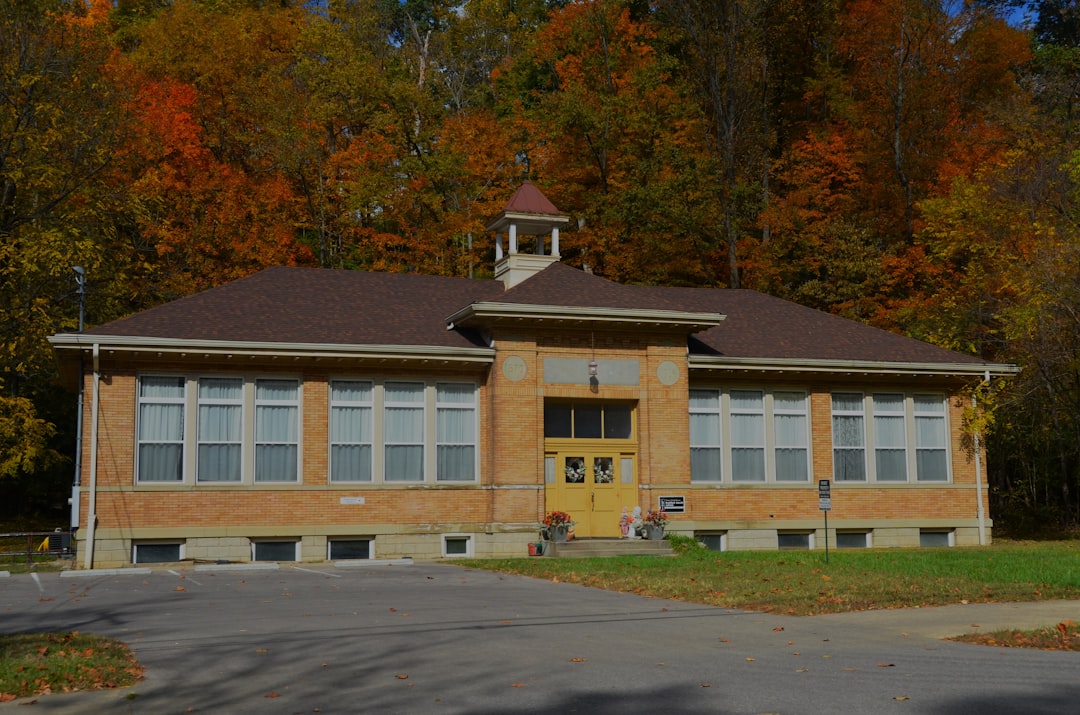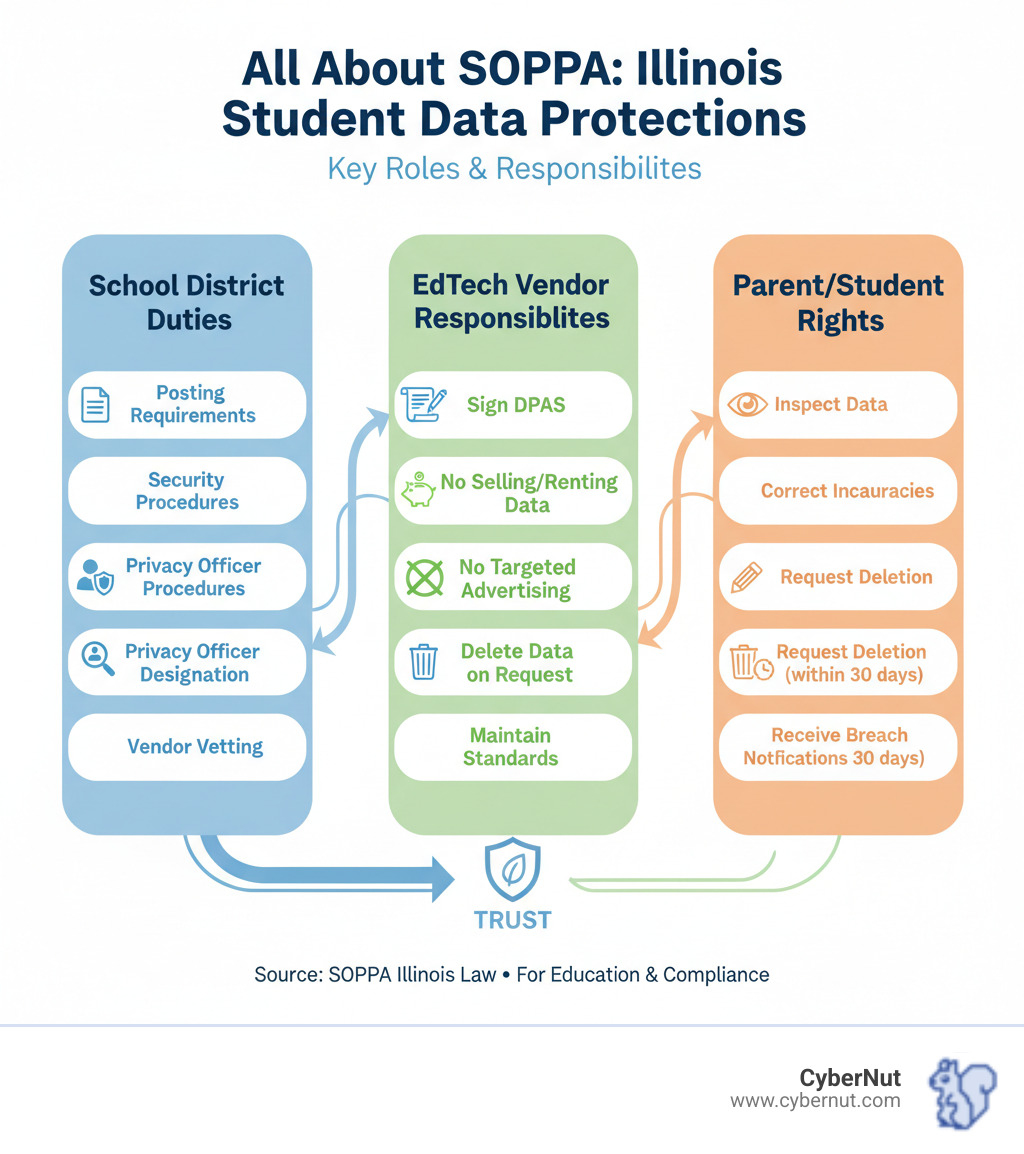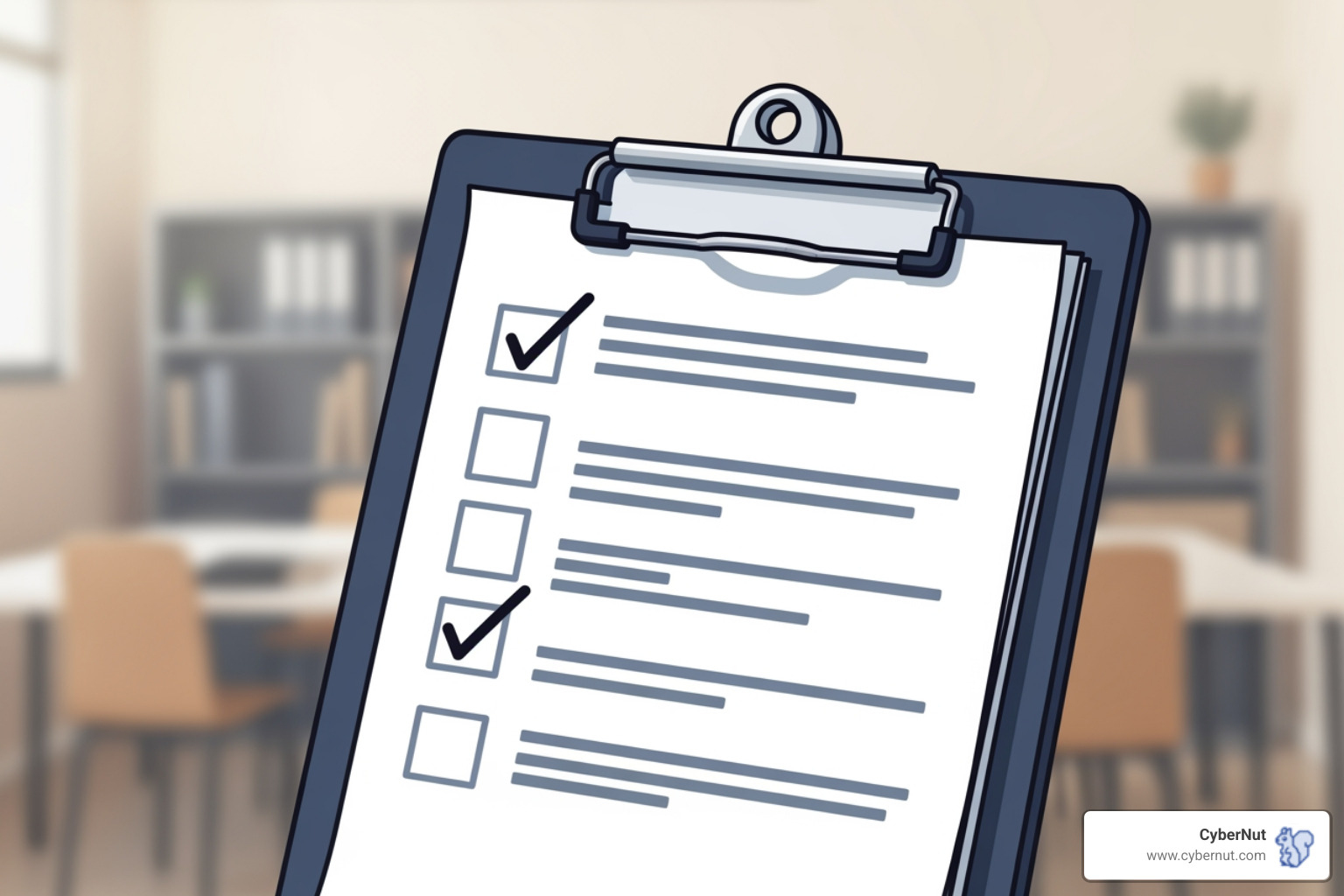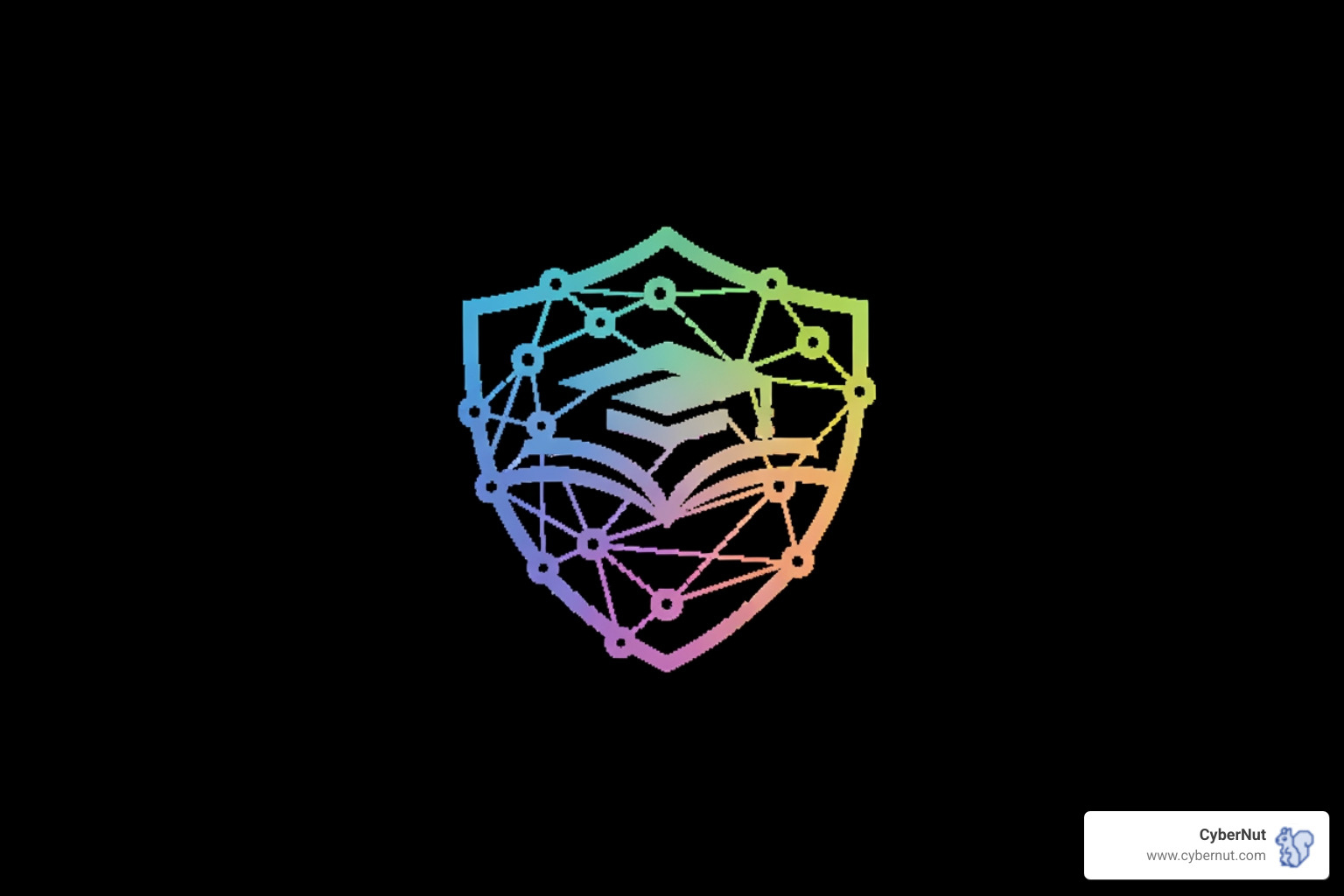
Oliver Page
Case study
October 29, 2025

All About SOPPA: What Illinois Schools Must Know About Student Data Protections starts with a critical date: July 1, 2021. As of then, Illinois schools became legally required to guarantee that student data collected by EdTech companies is protected and used for beneficial purposes only.
Quick Answer: SOPPA Key Requirements for Illinois Schools
The Student Online Personal Protection Act (SOPPA) regulates how schools, the Illinois State Board of Education, and EdTech vendors handle student "covered information"—which includes everything from names and addresses to grades and socioeconomic data.
As one Illinois district noted, SOPPA addresses the key question: "What protections do those companies have in place to make sure that our student's data is not sold or freely given to others?"
Non-compliance can lead to loss of funding, legal action, and exposure of student data. For K-12 IT Directors, SOPPA is a fundamental part of protecting your school community. This guide breaks down what SOPPA requires, how to comply, and how to build a culture of data privacy.

All About SOPPA: What Illinois Schools Must Know About Student Data Protections terms at a glance:
When Illinois school districts first heard about All About SOPPA: What Illinois Schools Must Know About Student Data Protections, many wondered how it differed from existing federal privacy rules. The answer is SOPPA's specific focus on how educational technology companies handle student information.
The Student Online Personal Protection Act (SOPPA) aims to ensure that student information shared with EdTech companies is protected and used only for educational purposes. It prevents data from being used for advertising, sold to data brokers, or used for any purpose that doesn't directly benefit student learning.
The strengthened version of SOPPA became effective on July 1, 2021, placing clear, enforceable responsibilities on school districts, the Illinois State Board of Education (ISBE), and EdTech vendors. Think of SOPPA as a shield around your students' digital footprints. You can review the full text of the Student Online Personal Protection Act (105 ILCS 85) for the complete legal language.
The 2019 amendments gave SOPPA real teeth by giving school districts explicit responsibilities, granting parents concrete rights, mandating public transparency, and increasing vendor accountability through required Data Privacy Agreements.
At the center of SOPPA is 'covered information'—any personally identifiable information (PII) about a student or data that could be linked to a specific child. This broad category includes:
This wide definition is intentional, designed to prevent sophisticated data profiling. For IT Directors, understanding what qualifies as covered information is the first step in compliance. Strong cybersecurity practices are essential to protect this data. Learn more in our guide on Cybersecurity for Educational Institutions.
Illinois school districts have specific, actionable duties under SOPPA. This section outlines the critical responsibilities for maintaining compliance and ensuring data security.

When All About SOPPA: What Illinois Schools Must Know About Student Data Protections is discussed, the focus is on what districts must do. Your primary duty is to guarantee that student data shared with EdTech companies is protected and used for beneficial purposes only.
Key responsibilities include:
Your website must include:
This information must be updated twice per year: by January 30 and within 30 days of the start of your fiscal year. For an example of how to organize this, see this district's approved vendor list. A comprehensive Data Security and Privacy Plan can help manage these requirements.
SOPPA requires each district to designate a staff member as a privacy officer to ensure compliance. This person, often called a Data Privacy Officer (DPO), is the central point of contact for student data privacy.
The DPO's responsibilities include overseeing SOPPA compliance, vetting EdTech vendors, managing DPAs, handling parent inquiries, and coordinating data breach responses.
On the security front, SOPPA mandates reasonable security procedures and practices that meet or exceed industry standards. This includes:
However, technical defenses are only part of the solution. Your staff is your first line of defense. Regular Cybersecurity Audits: Strengthening K-12 Schools Against Cyber Threats and comprehensive Cybersecurity Training: Empowering K-12 Staff Against Cyber Threats are crucial. Training your team to recognize threats like phishing is just as important as any firewall.
Third-party vendors are a major focus of SOPPA. Learn how Data Privacy Agreements (DPAs) and consortiums help schools manage these relationships securely.
When your district shares student data with an EdTech vendor, a Data Privacy Agreement (DPA) is the legal contract that protects that information. Under SOPPA, you must have a signed DPA with any company you share covered information with. This is not optional.
A DPA is a detailed contract that:
SOPPA also imposes strict prohibitions on vendors through these agreements. They are forbidden from engaging in targeted advertising using student data, selling or renting student data, or building student profiles for non-educational purposes.
Furthermore, DPAs include a data deletion requirement, compelling vendors to delete student data upon the district's request. This ensures information doesn't remain on their servers indefinitely. These requirements give schools legal leverage and clear expectations. For more on managing these relationships, see our guide on Beyond Firewalls: How to Secure Data Shared with Third-Party EdTech Vendors.

Negotiating individual DPAs with hundreds of vendors is impractical. This is where the Student Data Privacy Consortium (SDPC) comes in. The SDPC is a collaboration of schools, districts, and EdTech providers working to streamline student data privacy. In Illinois, the consortium operates through the Illinois Student Privacy Alliance (ISPA).
The SDPC helps districts by:
The SDPC transforms a potential compliance nightmare into a manageable, collaborative process. It provides the tools and support to meet SOPPA's requirements efficiently. You can learn more about the SDPC and see how it can benefit your district.
SOPPA empowers parents with new rights and establishes clear protocols for data breaches, while also interacting with other major privacy laws.
A powerful aspect of SOPPA is that it gives parents active control over their children's digital privacy. Parents have three fundamental rights regarding their student's covered information:
These actionable rights transform parents into partners in protecting student data. For a parent-friendly explanation, this short video explaining SOPPA for parents is a helpful resource. Understanding their Privacy rights is the first step.
Even with strong security, data breaches can happen. SOPPA mandates a quick and transparent response.

A data breach is the unauthorized acquisition of covered information. When a breach occurs, All About SOPPA: What Illinois Schools Must Know About Student Data Protections requires the following actions:
The only reason to delay notification is if law enforcement determines it would impede a criminal investigation. Having a solid Incident Response Planning in K12 framework is critical to meeting these tight deadlines.
Failing to comply with SOPPA carries serious consequences for both schools and vendors.
SOPPA works alongside federal laws like FERPA and COPPA, but it has a distinct role.
Understanding how these laws interact is key to a comprehensive compliance strategy. For more on FERPA, read FERPA: The Federal Student Privacy Law That Still Matters in 2025.
The single most important action is to ensure every third-party EdTech vendor has a signed, SOPPA-compliant Data Privacy Agreement (DPA) in place before any student "covered information" is shared.
This written agreement is the legal backbone of your compliance effort. It defines how student data will be protected and used. Sharing data with a vendor without a DPA is a direct violation of SOPPA and puts student information at risk. Before implementing any new app or platform, make sure the DPA is signed and posted on your website.
This is a nuanced issue. SOPPA gives parents the right to request the deletion of covered information, but it does not create a simple "opt-out" for all data collection.
Schools must balance parental rights with educational and legal obligations. A district may deny a deletion request if the data is required for the student to participate in the core curriculum or if deleting it would violate other laws (like student record retention rules). The data collected should be necessary for "educationally beneficial purposes only." Parents concerned about data collection should contact their district's Data Privacy Officer to understand what data is collected, why it's necessary, and what options are available.
Transparency is a core principle of SOPPA, so this information should be easy to find on your school district's official website.
Look for a dedicated page with a title like "SOPPA," "Student Data Privacy," or "Technology Resources." Many districts have a data privacy portal that centralizes this information. Many Illinois schools also use the Illinois Student Privacy Alliance (ISPA) portal, where you can search for your district and view its signed DPAs. If you can't find the information, contact your district's Data Privacy Officer or technology department directly.
Navigating All About SOPPA: What Illinois Schools Must Know About Student Data Protections is about one essential goal: keeping students safe in a digital world. For Illinois schools, SOPPA compliance is a commitment to building trust with families.
The act demands proactive data governance, from managing Data Privacy Agreements with vendors to respecting parental rights and responding swiftly to breaches. It requires transparency, accountability, and ongoing vigilance.
However, compliance documents alone can't stop a cyberattack. Schools Are Prime Targets for Cyber Attacks: The Urgent Need for Stronger Cybersecurity, and phishing remains a top threat. Protecting student data starts with your people. A well-trained staff is your most critical line of defense.
At CyberNut, we know that compliance and cybersecurity go hand in hand. We specialize in helping K-12 schools build a human firewall through engaging, effective training that sticks.
Want to see how vulnerable your district is to phishing? Get your free phishing audit today. It's a quick, eye-opening way to understand your risks.
With the right approach—combining legal compliance, robust security, and a well-trained staff—you can build a culture of cybersecurity that protects your students and earns community trust. For more guides and tools, explore our Resources page.

Oliver Page

Some more Insigths


Back